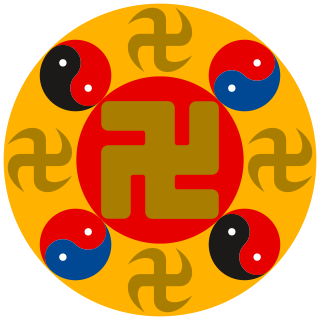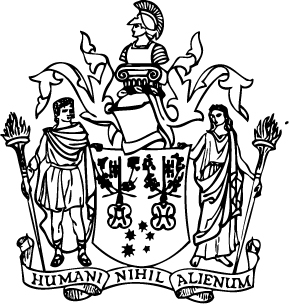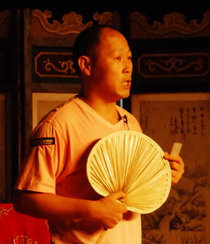Related Research Articles

Falun Gong or Falun Dafa is a new religious movement. Falun Gong was founded by its leader Li Hongzhi in China in the early 1990s. Falun Gong has its global headquarters in Dragon Springs, a 427-acre (1.73 km2) compound in Deerpark, New York, United States, near the residence of Li Hongzhi.

The China Youth Daily has been the newspaper of the Communist Youth League of China since 1951. It has editorial and financial independence in the People's Republic of China.
Li Hongzhi is a Chinese religious leader. He is the founder and leader of Falun Gong, or Falun Dafa, a United States-based new religious movement. Li began his public teachings of Falun Gong on 13 May 1992 in Changchun, and subsequently gave lectures and taught Falun Gong exercises across China.

Falun Gong, also called Falun Dafa, is a spiritual practice and system of beliefs that combines the practice of meditation with the moral philosophy articulated by its leader and founder, Li Hongzhi. It emerged on the public radar in the Spring of 1992 in the northeastern Chinese city of Changchun, and was classified as a system of qigong identifying with the Buddhist tradition. Li claimed to have both supernatural powers like the ability to prevent illness, as well having eternal youth and promised that others can attain supernatural powers and eternal youth by following his teachings. Falun Gong initially enjoyed official sanction and support from Chinese government agencies, and the practice grew quickly on account of the simplicity of its exercise movements, impact on health, the absence of fees or formal membership, and moral and philosophical teachings.
Li Hongzhi published the Teachings of Falun Gong in Changchun, China in 1992. They cover a wide range of topics ranging from spiritual, scientific and moral to metaphysical.

The Australian Academy of the Humanities was established by Royal Charter in 1969 to advance scholarship and public interest in the humanities in Australia. It operates as an independent not-for-profit organisation partly funded by the Australian Government.
The Tiananmen Square self-immolation incident took place in Tiananmen Square in central Beijing, on the eve of Chinese New Year on 23 January 2001. There is controversy over the incident; Chinese government sources say that five members of Falun Gong, a new religious movement that is banned in mainland China, set themselves on fire in the square. Falun Gong sources disputed the accuracy of these portrayals, and claimed that their teachings explicitly forbid violence or suicide. Some journalists have claimed that the self-immolations were staged.
David Murray Horner, is an Australian military historian and academic.
John Minford is a British sinologist and literary translator. He is primarily known for his translation of Chinese classics such as 40 chapters of The Story of the Stone, The Art of War, the I Ching and the Tao Te Ching. He has also translated Louis Cha's wuxia novel The Deer and the Cauldron and a selection of Pu Songling's Strange Tales from a Chinese Studio.

The persecution of Falun Gong is the campaign initiated in 1999 by the Chinese Communist Party (CCP) to eliminate the spiritual practice of Falun Gong in China, maintaining a doctrine of state atheism. It is characterized by a multifaceted propaganda campaign, a program of enforced ideological conversion and re-education and reportedly a variety of extralegal coercive measures such as arbitrary arrests, forced labor and physical torture, sometimes resulting in death.

Geremie R. Barmé is an Australian sinologist and film-maker on modern and traditional China. He was formerly Director, Australian Centre on China in the World and Chair Professor of Chinese History at Australian National University College of Asia and the Pacific in Canberra.

Kuang Biao (邝飚) is an influential Chinese political cartoonist and microblogger. He has worked at the Southern Metropolis Daily as its Cartoon Editor, and his work has been published in China Digital Times and the once-popular weekly Chinese newspaper Satire and Humor. Kuang says his cartoons mainly satirize official policy pronouncements and the misbehaviour of Communist party officials.
Liu Ts'un-yan 柳存仁 (1917–2009) was a scholar of Chinese letters and thought, an author of fiction, drama, and screenplays, and a major figure in the development of Asian Studies in Australia.
Lo Hui-min was a Chinese and Australian historian of the late Qing and Republican periods, best-known for his work on George Ernest Morrison and Ku Hung-ming.
The George Ernest Morrison Lecture in Ethnology is given annually at the Australian National University in honour of George Ernest Morrison. The Lectures, founded by the Chinese community in Australia "to honour for all time the great Australian who rendered valuable service to China" were also, in the words of Geremie Barmé "related to Chinese-Australian resistance to White Australia policy, reflecting also the alarm and outrage resulting from the Japanese invasion of Manchuria in 1931." Several of the older lectures were reprinted in 1996 by East Asian History.
East Asian History is a biannual peer-reviewed open-access academic journal published by the Australian National University. It was established in 1970 as Papers on Far Eastern History, obtaining its current title in 1991. Published by ANU's Research School of Pacific and Asian Studies, it was part of a growth in publication on Asian studies in Australia in the 1970s. Originally "founded as a forum for the publication of papers written by the faculty and students of Australian National University" affiliates of ANU continued to "represent the large majority of its contributors, although over the years there have been increasing contributions from scholars from other universities in Australia and abroad." Chinese History: A Manual included the journal as one of the main Western-language journals for research on Chinese history.

The Religion of Falun Gong is a 2012 nonfiction book by Benjamin Penny, published by the University of Chicago Press, that discusses the Falun Gong's belief system.
Falun Gong and the Future of China is a 2008 book by David Ownby, published by Oxford University Press.
Qigong Fever: Body, Science, and Utopia in China is a 2007 book by David A. Palmer, published by Columbia University Press. It is about the "Qigong fever" in the late 20th century in China.
References
- 1 2 Harold White Fellow. Retrieved 14 January 2015
- ↑ Dr Benjamin Penny, Deputy Director, Australian Centre on China in the World. Retrieved 14 January 2015
- ↑ The Religion of Falun Gong – Editorial Reviews. Retrieved 30 January 2015
- ↑ Newington College Register of Past Students 1863–1998 (Syd, 1999) pp155
- ↑ ANU Researcher. Retrieved 14 January 2015
- ↑ Choice Magazine: CHOICE Outstanding Academic Title Awards University of Chicago Press
- ↑ Penny, Benjamin (13 April 2012), The religion of Falun Gong, University of Chicago Press (published 2012), ISBN 978-0-226-65501-7
- ↑ University of Chicago Press. Retrieved 14 January 2015
- ↑ The Religion of the Falun Gong University of Toronto Library
- ↑ Dr Benjamin Penny. Retrieved 14 January 2015
- ↑ Penny, Benjamin; Liu, Cunren (2006), Daoism in history : essays in honour of Liu Tsʼun-yan, Routledge (published 2005), ISBN 978-0-415-34852-2
- ↑ Penny, Benjamin (2002), Religion and biography in China and Tibet, Curzon, ISBN 978-0-7007-1177-2